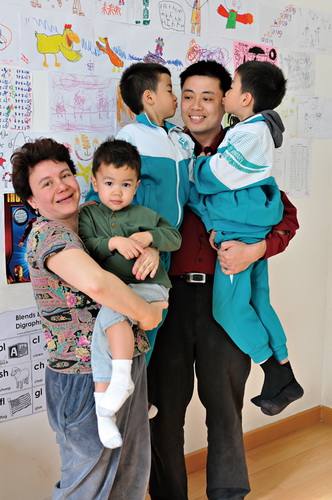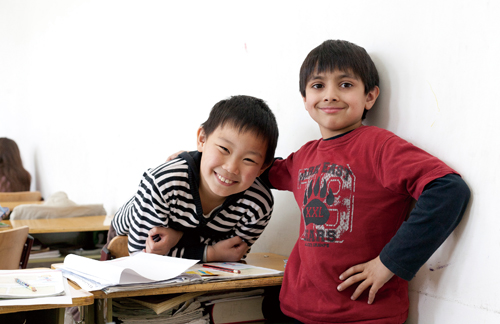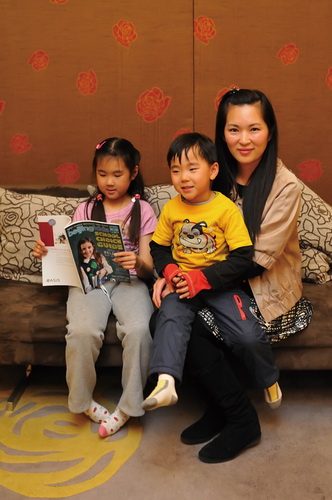 Ethan and Isaac Lin are bouncing off the walls – literally. Their 2-year-old brother Joshua attempts to join them in jumping on the bed, but it ends in disaster, with him wailing inconsolably in his mom’s arms after a traumatic collision and fall. His older twin brothers are momentarily stilled, sheepish at having caused the emotional meltdown.
Ethan and Isaac Lin are bouncing off the walls – literally. Their 2-year-old brother Joshua attempts to join them in jumping on the bed, but it ends in disaster, with him wailing inconsolably in his mom’s arms after a traumatic collision and fall. His older twin brothers are momentarily stilled, sheepish at having caused the emotional meltdown.
Soon the crying ceases and they’re back to business, throwing paper airplanes off the balcony in soaring trajectories.
It’s a beautiful golden afternoon, perfect for playing outside in the garden. They’ve earned their playtime too. Sunlight streams onto the walls of their room, where a poster from Beijing Xiyi Elementary School (北京西颐小学) declares them both “Outstanding Foreign Students.”
The boys are both in first grade at Xiyi, and thriving.
“I wouldn’t say they’re on par with their peers,” mom Jenny Lin admits, acknowledging the pool of candidates for the award might have been pretty small. Still, it’s impressive for kids who, less than two years ago, were placed in a local kindergarten with extremely limited Chinese.
In the US, their dad spoke some Chinese with them, but it wasn’t
enough, so the family moved to Beijing.
“They picked up everything pretty easily. They never complained
about the experience,” Lin recalls.
The transition might have been eased by the presence of a built-in playmate. Without each other, the language barrier might have caused some adjustment trouble.

“They speak Chinese when they play together,” Lin smiles.
However, now that they’re in elementary school, it’s not all play. There’s a lot of homework – much more than they would have in the US.
But Lin points out, the pressure is off to make perfect grades. The family plans to return to the US in the near future, so the boys don’t have pressure to produce flawless scores to get them into local high schools and universities one day.
It’s exactly this lack of pressure that makes some local schools reluctant to accept foreigners. The local kids who stay within the Chinese education system for the duration of their academic careers are the ones upholding academic standards. Still, there are quotas for accepting foreign students, and local schools have to allow them in.
Famous for it’s Peking opera program, Xiyi was one of the first schools in Beijing to accept foreign students. Ethan and Isaac enjoy the opera courses, though Isaac claims physical education, especially jump rope, is his favorite subject. Ethan prefers art, as evidenced by the fastidious sketches at his desk.
One fear the Lins have is that the boys’ English will suffer during their time in China.
“I try to keep it up with books and [iPad] apps,” says Jenny Lin. “But when we go back to the US, they might be a little behind.”
You win some, you lose some. Their Chinese has improved drastically, while perhaps their English has lapsed for the time being. It’s the tension of a cross-cultural, bilingual life. When they return to the US, Lin and her husband would like to put the boys in a Mandarin immersion program, if they can find one.
“It depends on where we move,” she says.
Keeping their kids’ Mandarin strong is also a must for Jenny Chang and Charlie Lu, whose 7-year-old daughter Britney attends Shijia Hutong Elementary School (史家胡同小学).
Chang and Lu spoke Mandarin at home with their children when they lived in California, but, like the Lin family, they felt it wasn’t enough.
“We didn’t want to lose our roots,” Chang says. “We wanted to come back to China so the kids could speak Chinese fluently and experience living in China.”
It wasn’t easy at first. Britney started at Shijia in September 2011, and the total immersion was a bit of a shock.
“She was crying a lot,” Chang recalls. “They are very strict. You have to write the characters perfectly.”
Chang is originally from Taiwan, so she couldn’t help her daughter with the simplified characters. And even if she could, the teachers were very exacting.
“Britney thought her work was very good, but the teachers said, ‘No. Do it again,’” Chang remembers. “It was very difficult.”
Her younger son, Aaron, attends preschool at the Canadian International School of Beijing. She says for him, at his age, the more relaxed, freestyle approach to learning is good. Creativity and flexibility are encouraged.
When he reaches Britney’s age, though, it’s off to a local school. According to Chang, the local schools have much higher academic standards, and the teachers are more experienced and qualified. And of course, Britney’s Mandarin is improving by leaps and bounds.
With these benefits come the trappings of traditional Chinese education: strict teachers, no flexibility, and hours and hours of homework.
“In her school, you must sit very straight, face the front, and repeat after the teacher,” Chang relates. “Even if you have to use the bathroom, you have to wait until class is over.”
Once Britney adjusted to the strict system, and her Chinese improved, she settled in well. She has lots of friends at Shijia, with whom she speaks Chinese.
“She likes it now. She’s settled,” Chang says. “She has a tutor to help her with homework.”
The teachers are very communicative with the parents, giving frequent updates on a student’s progress.
“Sometimes it’s hard for me to read the text messages they send,” laughs Chang. “I can’t understand the characters. I think it would be difficult for parents if they didn’t speak Chinese at all.”
Chang and her husband chose Shijia because it’s conveniently located near their home on the east side of the city, and because of its excellent reputation. There seem to be even fewer foreign students enrolled at Shijia than Xiyi, though; Britney has no foreign friends in her class.
The family wants to move back to the US eventually, so like the Lin family, the pressure for perfect grades is low. Britney makes good grades anyway, Chang says, but the important thing is that her Chinese has improved so much in just one school year.
For these families, the decision to place their kids in local schools to improve their Mandarin are, at least partially, culturally-based. Whether to return to their lingual roots or to ensure the kids can speak the native tongue of one parent, it’s a choice that is personal – practicality is a bonus.
For Jim and Natasha Hormzudiar, practicality rather than personal ties led them to Beijing, where both their sons attend local schools. “We always wanted to live abroad, and we had the opportunity, so we took it,” Jim says.
Their elder son Zaren is in second grade at Fangcaodi International School (芳草地小学), arguably the best elementary school in Beijing, and their younger son Sohan is at Venus Kindergarden (启明双语幼儿园). Zaren was in a Mandarin immersion program in his California public school for two years before they moved to Beijing.
Though Natasha speaks fluent Hindi, and Spanish is still a top choice for language study in the US, the Hormzudiars feel Chinese is the way forward.
“The way the world is changing right now, it’s negligent not to teach your kids [about]foreign languages and culture,” Jim insists.
The experience of studying Chinese in China has opened the kids’ eyes. Before, Zaren didn’t really understand the importance of learning Chinese. But now, he realizes kids play and speak in this language.
Before, Natasha would try to teach him some Hindi words, and he’d say, “Mom, talk normal!” Jim says. But now, he’s more receptive to languages in general.
There are a good number of other international students in his class, and though he’s naturally gravitated toward the other Americans, he has friends of all nationalities.
Zaren says it was hard at first, but it got easier the second term. “I’m better with tones, but my friend is better with speaking,” he says.
For Sohan, the adjustment was harder. He didn’t know any Chinese, and it was incredibly frustrating for him.
“Normally he’s the joker in the family, but at first he was kind of angry,” Natasha says. “He didn’t understand why he had to speak Chinese.”
Now he uses lots of expressions and vocabulary. On a recent vacation to South Korea, he insisted on speaking Chinese to the Korean waiters in restaurants, despite his parents’ protests.
“We said, ‘Honey, they don’t speak Chinese,’” Jim laughed. “But they did! He asked them for a spoon instead of chopsticks, and then he said, ‘See! They know Chinese.’”
Neither of the parents speak fluent Chinese, so a tutor helps the boys with their homework. Despite the adjustment and the initial difficulty for their littlest, the Hormzudiars think this is an invaluable experience for their boys. When they return to the US, they’ll keep the boys in a Mandarin immersion program.
Whether for affordability, family background, or the growing importance of Chinese in the world, local schools are the perfect fit for these families.
This article is excerpted from beijingkids May 2012 issue. View it in PDF form here or contact distribution@beijing-kids.com to find out where you can pick up your free copy.



